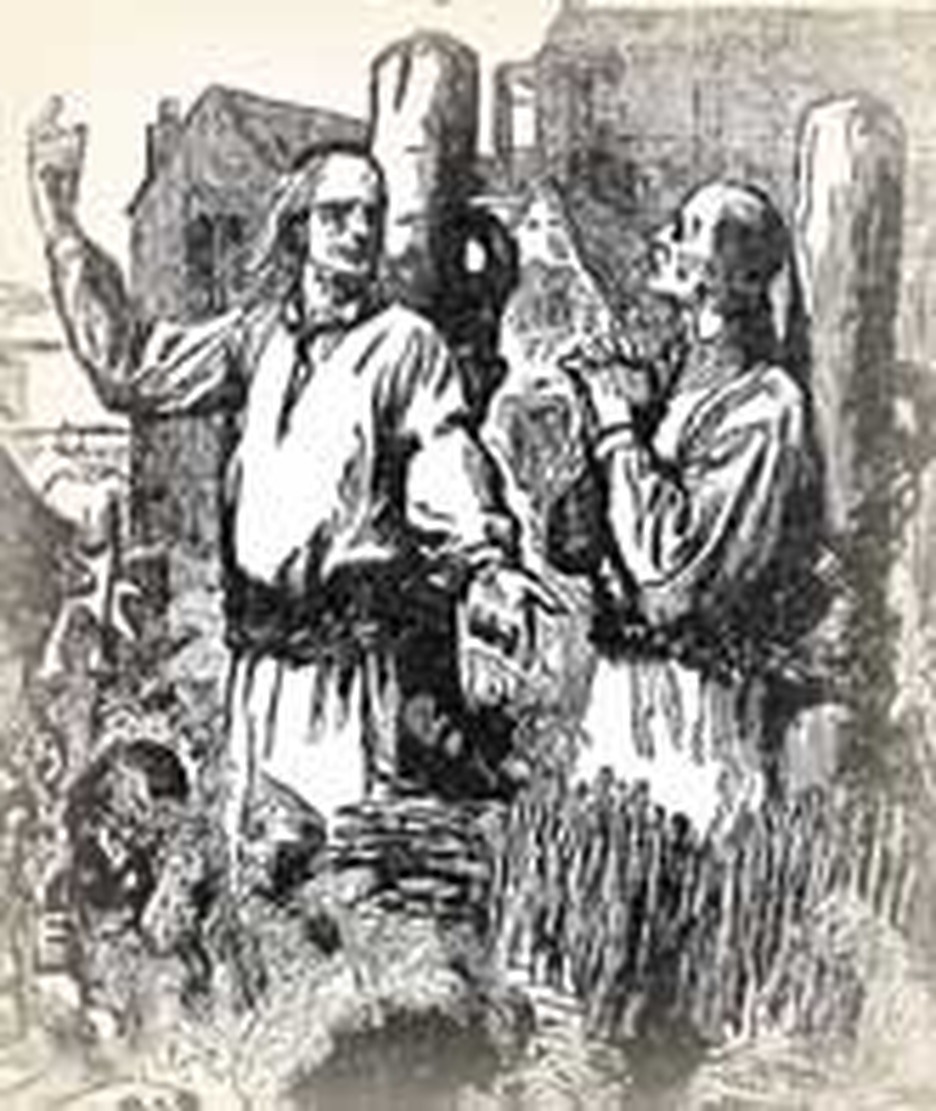
Queen Mary ascended the throne of England in 1553. In subsequent years, she had at least two hundred people put to death (often by fire) for their religious convictions. To history she became known as "Bloody Mary," although, in truth, she killed far fewer people per year than her brutal father. It was the godliness of many of her victims made them stand out.
Mary's father, King Henry VIII had separated the Church of England from the Roman Catholic church, but he had not reformed the church's practices or doctrines. On Henry's death, his young son Edward became King. Many of Edward's advisors tried to move the English church in the direction of a more Bible-based Christianity. Two such men were Nicholas Ridley and Hugh Latimer.
The scholar Nicholas Ridley had been a chaplain to King Henry VIII and was Bishop of London under his son Edward. He was a preacher beloved of his congregation whose very life portrayed the truths of the Christian doctrines he taught. In his own household he had daily Bible readings and encouraged Scripture memory among his people.
Hugh Latimer also became an influential preacher under King Edward's reign. He was an earnest student of the Bible, and as Bishop of Worcester he encouraged the Scriptures be known in English by the people. His sermons emphasized that men should serve the Lord with a true heart and inward affection, not just with outward show. Latimer's personal life also re-enforced his preaching. He was renowned for his works, especially his visitations to the prisons.
When Mary became Queen of England, she worked to bring England back to the Roman Catholic Church. One of her first acts was to arrest Bishop Ridley, Bishop Latimer, and Archbishop Thomas Cranmer. After serving time in the Tower of London, the three were taken to Oxford in September of 1555 to be examined by the Lord's Commissioner in Oxford's Divinity School.
When Ridley was asked if he believed the pope was heir to the authority of Peter as the foundation of the Church, he replied that the church was not built on any man but on the truth Peter confessed -- that Christ was the Son of God. Ridley said he could not honor the pope in Rome since the papacy was seeking its own glory, not the glory of God. Neither Ridley nor Latimer could accept the Roman Catholic mass as a sacrifice of Christ. Latimer told the commissioners, "Christ made one oblation and sacrifice for the sins of the whole world, and that a perfect sacrifice; neither needeth there to be, nor can there be, any other propitiatory sacrifice." These opinions were deeply offensive to Roman Catholic theologians.
Both Ridley and Latimer were burned at the stake in Oxford on this day, October 16, 1555. As he was being tied to the stake, Ridley prayed, "Oh, heavenly Father, I give unto thee most hearty thanks that thou hast called me to be a professor of thee, even unto death. I beseech thee, Lord God, have mercy on this realm of England, and deliver it from all her enemies."
Ridley's brother had brought some gunpowder for the men to place around their necks so death could come more quickly, but Ridley still suffered greatly. With a loud voice Ridley cried, "Into thy hands, O Lord, I commend my spirit...", but the wood was green and burned only Ridley's lower parts without touching his upper body. He was heard to repeatedly call out, "Lord have mercy upon me! I cannot burn..Let the fire come unto me, I cannot burn." One of the bystanders finally brought the flames to the top of the pyre to hasten Ridley's death.
Latimer died much more quickly; as the flames quickly rose, Latimer encouraged Ridley, "Be of good comfort, Mr. Ridley, and play the man! We shall this day light such a candle by God's grace, in England, as I trust never shall be put out."
The martyrdoms of Ridley, Latimer, and Thomas Cranmer are today commemorated by a Martyrs' monument in Oxford. The faith they once died for can now be freely practiced in the land.
Bibliography:
- Adapted from an earlier Christian History Institute story.
- Durant, Hugh. The Reformation. New York: Simon and Schuster, 1957.
- Hendrickson, Ford. Martyrs and Witnesses. Detroit: Protestant Missionary Pub Co., [1917]
- "Latimer, Hugh" and "Ridley, Nicholas." Dictionary of National Biography. Edited by Leslie Stephen and Sidney Lee. London: Oxford University Press, 1921 - 1996.
- "Latimer, Hugh" and "Ridley, Nicholas." The Oxford Dictionary of the Christian Church. Edited by F. L. Cross and E. A. Livingstone. Oxford, 1997.
- Ryle, J. C. Five English Reformers. Banner of Truth Trust, 1961.
- Stuart, Clara H. Latimer; Apostle to the English. Grand Rapids, Michigan: Zondervan, 1986.
Last updated July, 2007.








